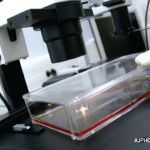Metabolic myopathies are diseases caused by rare genetic defects that interfere with the energy-generating processes in skeletal muscles. A metabolic myopathy is caused when not enough of a particular enzyme is present to cause the necessary reactions. The name of each metabolic myopathy is based on which pathway has the deficient enzyme. For example, diseases brought on by a defect in sugar metabolism are called glycogen storage diseases. Lipid storage diseases are due to abnormal fat processing. Finally, mitochondrial myopathy is the term used when the enzyme present in mitochondria is deficient.
Symptoms of metabolic myopathies include weakness, tiring easily with exercise or physical activity, suffering muscle pain after physical effort, and experiencing severely swollen and tender muscles—all caused by the muscle cells not getting enough energy. Without the right amount of energy, the muscle lacks enough fuel to work properly. Metabolic myopathies tend to run in families, appearing at any age in those who inherit the disease. However, they can also develop in a person with no family history of the condition, according to fact sheet author Robert L. Wortmann, MD, a rheumatologist at Dartmouth Hitchcock Medical Center in Lebanon, N.H.
Myopathy diagnosis is typically done through biopsies, but more recent techniques enable diagnosis through genetic testing of blood samples. Treatment plans vary based on which myopathy is diagnosed, but generally focus on changes in physical activities, aerobic exercise training, changes in diet, and the use of various vitamins or supplements, which help the patient lead a normal life.
Download the complete metabolic myopathies fact sheet and other patient education materials at www.rheumatology.org by following the links to patient education from the Practice Support menu.

